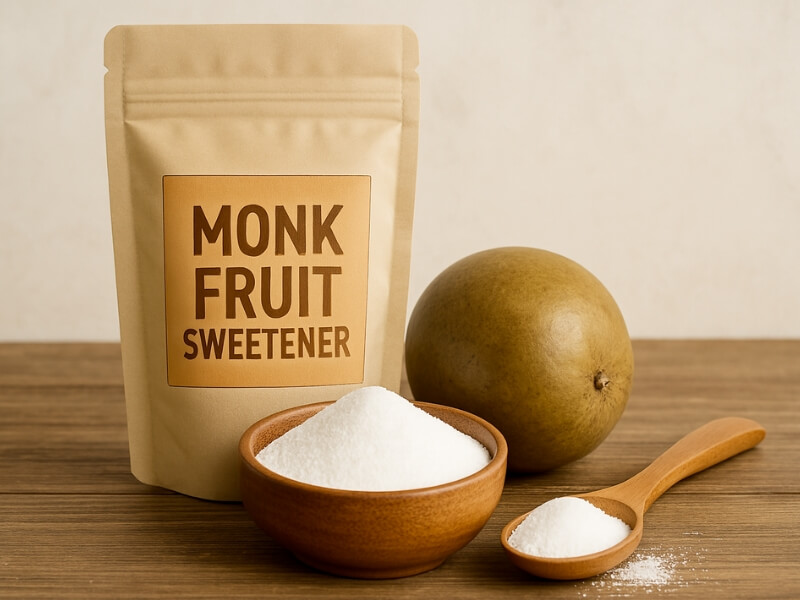Monk Fruit Sweetener Glycemic Index, Glycemic Load, and Blood Sugar Response Chart

Based on
Blood Glucose Response Chart
Monk fruit sweetener has a low Glycemic Index (GI) of 0 and a Glycemic Load (GL) of 0 (per 100g), making it an ideal sugar substitute for blood sugar management.
Derived from Siraitia grosvenorii (Luo Han Guo), native to Southeast Asia, monk fruit sweetener is a natural sweetener that is 150-250 times sweeter than sugar but is non-caloric and does not impact blood glucose levels.
Unlike conventional sugar, its sweetness comes from Mogrosides, compounds that do not metabolize like carbohydrates. Mogrosides also possess antioxidant properties, which support overall health and immune function.
Monk fruit sweetener is it an effective choice for diabetics and those following low-carb or ketogenic diets.
Monk Fruit Sweetener's Zero Glycemic Impact
The Glycemic Index (GI) and Glycemic Load (GL) of monk fruit sweetener are both zero because it does not contain glucose, fructose, or sucrose, which are the primary contributors to glycemic response. Instead, monk fruit sweetener derives its sweetness from Mogrosides, natural compounds that the body does not metabolize as sugar, meaning they do not cause a spike in blood sugar levels.
Additionally, monk fruit sweetener contains zero digestible carbohydrates, making it an excellent choice for low-carb, ketogenic, and diabetic-friendly diets. Since mogrosides pass through the body without being absorbed, monk fruit does not impact insulin levels, making it a preferred natural sugar alternative.
Digestion and Absorption
Monk fruit sweetener’s zero Glycemic Index and Glycemic Load stem from the way it is processed in the body.
Mogrosides, the active sweetening compounds, are non-digestible glycosides that pass through the small intestine without absorption. Unlike glucose or fructose, mogrosides are not broken down into simple sugars, meaning they do not enter the bloodstream or impact blood sugar levels. Instead, they reach the colon, where they may be partially fermented by gut bacteria without triggering an insulin response.
Because they do not contribute glucose, monk fruit sweetener does not influence Glycemic Load, making it an ideal choice for blood sugar management.
Metabolism in the Gut
Monk fruit sweetener remains glycemically inactive even after digestion, as its primary compounds, Mogrosides, undergo microbial fermentation instead of breaking down into glucose. This ensures no blood sugar spike or Glycemic Load impact.
Once Mogrosides reach the large intestine, gut bacteria partially ferment them, converting them into mogrol, a bioactive compound with antioxidant properties. Unlike carbohydrates, which break down into glucose and influence Glycemic Index (GI) and Glycemic Load (GL), mogrosides do not enter the bloodstream as sugars.
This distinct metabolic pathway further reinforces monk fruit sweetener’s suitability for blood sugar control, ketogenic diets, and diabetes management.
Blood Sugar and Insulin Response
Monk fruit sweetener has no impact on blood sugar or insulin levels because its active compounds, mogrosides, are not converted into glucose. This makes it a zero-GI, zero-GL sweetener that does not contribute to insulin resistance or metabolic stress.
Mogrosides pass through the digestive system without breaking down into absorbable sugars, meaning they do not enter the bloodstream or trigger insulin release.
Unlike traditional sweeteners that cause rapid blood sugar spikes, monk fruit maintains stable glucose levels. The absence of an insulin response ensures it does not contribute to hyperglycemia, insulin resistance, or metabolic disorders, making it a suitable option for diabetics and those managing blood sugar levels effectively.
Why Monk Fruit is an Ideal Sugar Alternative?
Monk fruit sweetener is a safe, natural, and metabolically neutral alternative to sugar.
Unlike stevia, which has a slightly bitter aftertaste, or erythritol, which can cause digestive discomfort, monk fruit is well tolerated. It also does not contribute to tooth decay or other sugar-related health issues, making it a superior choice.
Monk Fruit is a Superior Sweetener for Blood Sugar Control
Monk fruit sweetener’s zero Glycemic Index and Glycemic Load result from its unique molecular structure (mogrosides), which are not metabolized into glucose. Since it is not absorbed in the small intestine, does not stimulate insulin release, and has no carbohydrate content, it has no effect on blood sugar levels. This makes monk fruit sweetener an optimal sugar alternative for diabetics, ketogenic diets, and metabolic health.